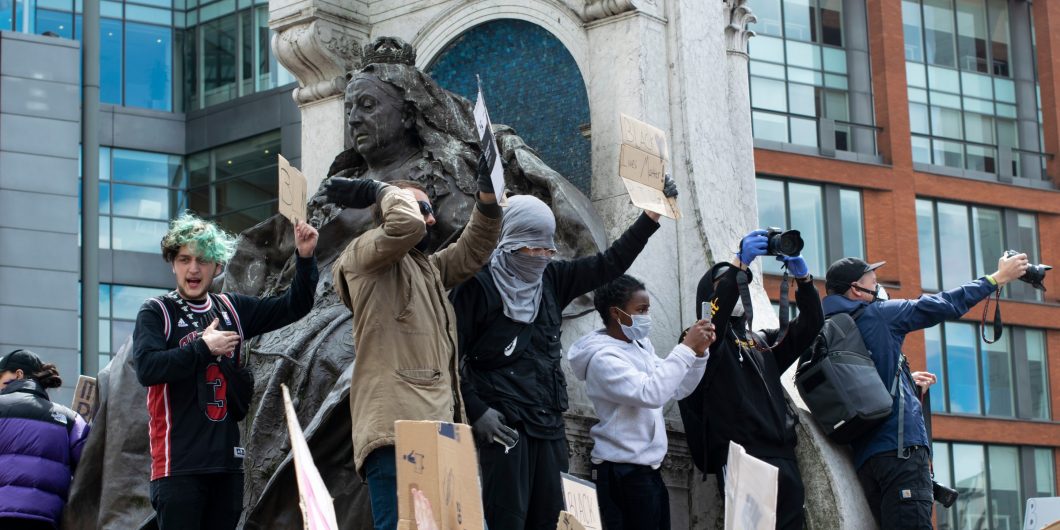Education activists are now associating standards of good writing with “white supremacy.” This is a truly racist claim.
To See Ourselves as Others See Us
When a review copy of Konstantin Kisin’s An Immigrant’s Love Letter to the West landed on my doormat late last year, Kisin was one half (with Francis Foster) of a popular but geographically constrained chat-show, Triggernometry, and very much a neophyte writer. Love Letter is his first book.
Since then—in a process that unfolded while I was reading it, which itself was a discombobulating experience for this humble book hack—Kisin has become a global phenomenon, having delivered a speech to the Oxford Union now viewed tens of millions of times on YouTube, various news channels, and elsewhere. Already a British bestseller, Americans have been forced to order Love Letter hardcopies from UK bookchains and British Amazon unless willing to wait until July this year, when it has its US release.
Whether you get it flown to you across the pond—complete with British spelling—or opt to wait for the local version, this is something I recommend you do. More than anything else, An Immigrant’s Love Letter to the West explains how Kisin grew into the sort of person able to deliver that sort of speech. Part memoir, part manifesto—and written in an engaging and popular style as befits his background in stand-up comedy—Love Letter is a reminder that sometimes outside observers can tell us more about ourselves than we know ourselves.
In this, it flies in the face of claims that only personal “lived experience” has probative value, that travelers who go to foreign countries and return with both tall tales and true ones are engaging in orientalism, cultural appropriation, or colonialism.
Just old enough to live through the last decade of the Soviet Union and its education system, Kisin uses his book’s memoirist elements to illuminate his manifesto which, briefly stated, is that destructive ideologies have started to undermine Western countries and their democratic, liberal values. The West is better than we are led to believe. It’s also better than the naïve and utopian alternatives offered up by people who are exploiting a historically unusual trait: the willingness to admit that one’s country or tradition has been wrong.
When the facts change, I change my mind. What do you do, sir?
Two parts are particularly telling. First, Kisin’s account of his grandfather’s treatment for criticising the USSR’s 1979 invasion of Afghanistan, and second, the long section on the extraordinarily partial history of slavery often taught to Americans.
From Russia, with Love
Someone Grandfather Kisin thought was a friend reported him to the KGB. First, police raided his house, arresting him for owning a shortwave radio. He wasn’t a public figure, but an able and respected academic physicist. “To clarify,” Kisin goes on, “he wasn’t caught actively listening to the BBC; he simply had a wireless radio which had the potential to pick it up.”
Now, this was the Soviet Union in its decline. Leonid Brezhnev was General Secretary. The gulag archipelago still existed but in an attenuated form. Slowly but surely, the imperial wheels were falling off. Love Letter is clear that comparing Brezhnev to Joseph Stalin in terms of murderous culpability is nonsense. Kisin grand-père wasn’t imprisoned or deported to Siberia. Instead, he was sacked and ostracised, thus rendered unemployable. Then his wife was sacked. His (working) kids were sacked. Konstantin’s father—the youngest—was sent down from university. “His name and reputation became so radioactive,” Kisin recounts, “I’ve taken to calling him Grandpa Novichok.”
After a long period where he heard little other than criticism of the UK and how dreadful it is, Kisin began to wonder if he were being given subtle and not so subtle hints to pack his bags and return to Russia.
At this point, Kisin springs his trap. He notes what happens to people in our day when they advance the view that there are only two sexes “in a public forum.” Late Soviet it may be. We aren’t in Stalinland—yet. But for Western liberal democracies to resemble the USSR’s dying embers is alarming enough, if only because this type of authoritarianism tends to get worse, not better. The Soviet Union was unusual in that it became less oppressive over time, a process not fully reversed until Vladimir Putin gathered all Russia’s levers of power into his hands and invaded Ukraine.
“My great-grandfather was a slave,” begins Kisin’s twenty-page disquisition on slavery. In it, he manages to teach a fair bit of Russian and Ukrainian history: the Holodomor, the gulags, the bogus psychiatric hospitals, and how the Communists reintroduced slavery shortly after the Tsars abolished the country’s unusually noisome form of serfdom. In what will undoubtedly be a bucket of ice water in the face for many Americans, he then moves onto the Barbary Corsairs—Muslim slavers who deliberately targeted Europeans and sexually fetishised the fairest among them, especially the Irish—and the African kingdoms who were busily enslaving each other’s people long before Arabs, Europeans, and Americans appeared on the scene.
The chapter is bracing not only because it blends Kisin’s baleful family story with a longue durée approach to slavery. It also gives form and substance to the queasy feeling many Europeans get when we see black Americans and Palestinians on social media attempting to play the Oppression Olympics against Jews, Ukrainians, and Gypsies. I don’t think it’s improper or unreasonable to compare the Holocaust, Holodomor, or Great Leap Forward with other genocides or even non-genocidal historical atrocities—indeed, I have written an entire book doing so within that appalling group—but it should be done with more care than is typically evinced by many Americans and Arabs. Kisin’s deft, composed historical survey is a useful lesson on this point.
To See Ourselves as Others See Us
Taken as a whole, Kisin’s most valuable service in An Immigrant’s Love Letter to the West inheres in the simple act of holding up a mirror to Britain’s face and describing what he sees. Often, it’s positive, as well as amusing. “As someone with dark hair and dark skin, I experienced more racism in my own country than I have in this green and pleasant land,” he says at one point. “My one and only encounter with racism was at school when someone told me to ‘go back to Russia’ before adding, ‘you Paki.’ Naturally, I haven’t spoken to that teacher since. Worst geography teacher ever.”
However, Kisin’s examination of Western displays of what Sir Roger Scruton called oikophobia—hatred of one’s home, common among elite left-liberals—does give pause. After a long period where he heard little other than criticism of the UK and how dreadful it is, he began to wonder if he were being given subtle and not so subtle hints to pack his bags and return to Russia. “None of the people who tell you how evil, bigoted, racist, and sexist the West is ever move to any of the other ‘much better’ countries—but maybe they want me to?”
He also recounts his responses to those who try to give him what he calls “a sales pitch on communism,” which by his own admission has generated some characteristic Russian explosions. “These people, who tend to have double-barrelled names and posh accents, are either tone-deaf to the point of ignorance—or they’re telling me to bugger off back to Russia.”
Of late, he’s started confronting woke and leftie interlocutors on this point, describing how their claims make them look to outsiders. And yes, the back-pedalling produced thereby is fast and furious, while the lesson for the rest of us is a valuable one. “You need to take a good long look at yourself” is something most people have heard when children—usually from parents or teachers. The Roman Stoic injunction to develop an awareness of how one comes across to others is also relevant here.
Robbie Burns, the national poet of Scotland, in his famed poem To a Louse (On Seeing One on a Lady’s Bonnet at Church) reminds us that we can be disabused of our pretensions when we’re able to see ourselves through each other’s eyes. A beautiful, upstanding, well-dressed woman who thinks herself fine indeed looks very different to the churchgoers who can see visible nits crawling over her hair.
O wad some Power the giftie gie us
To see oursels as ithers see us!
It wad frae mony a blunder free us,
An’ foolish notion:
What airs in dress an’ gait wad lea’e us,
An’ ev’n devotion!O would some Power the gift to give us
To see ourselves as others see us!
It would from many a blunder free us,
And foolish notion:
What airs in dress and gait would leave us,
And even devotion!
Westerners who hate their own countries may think themselves moral, and enlightened, and better than their fellow citizens. But that’s not how they look to outsiders like Konstantin Kisin. For those observations alone, An Immigrant’s Love Letter to the West is full of insight.



